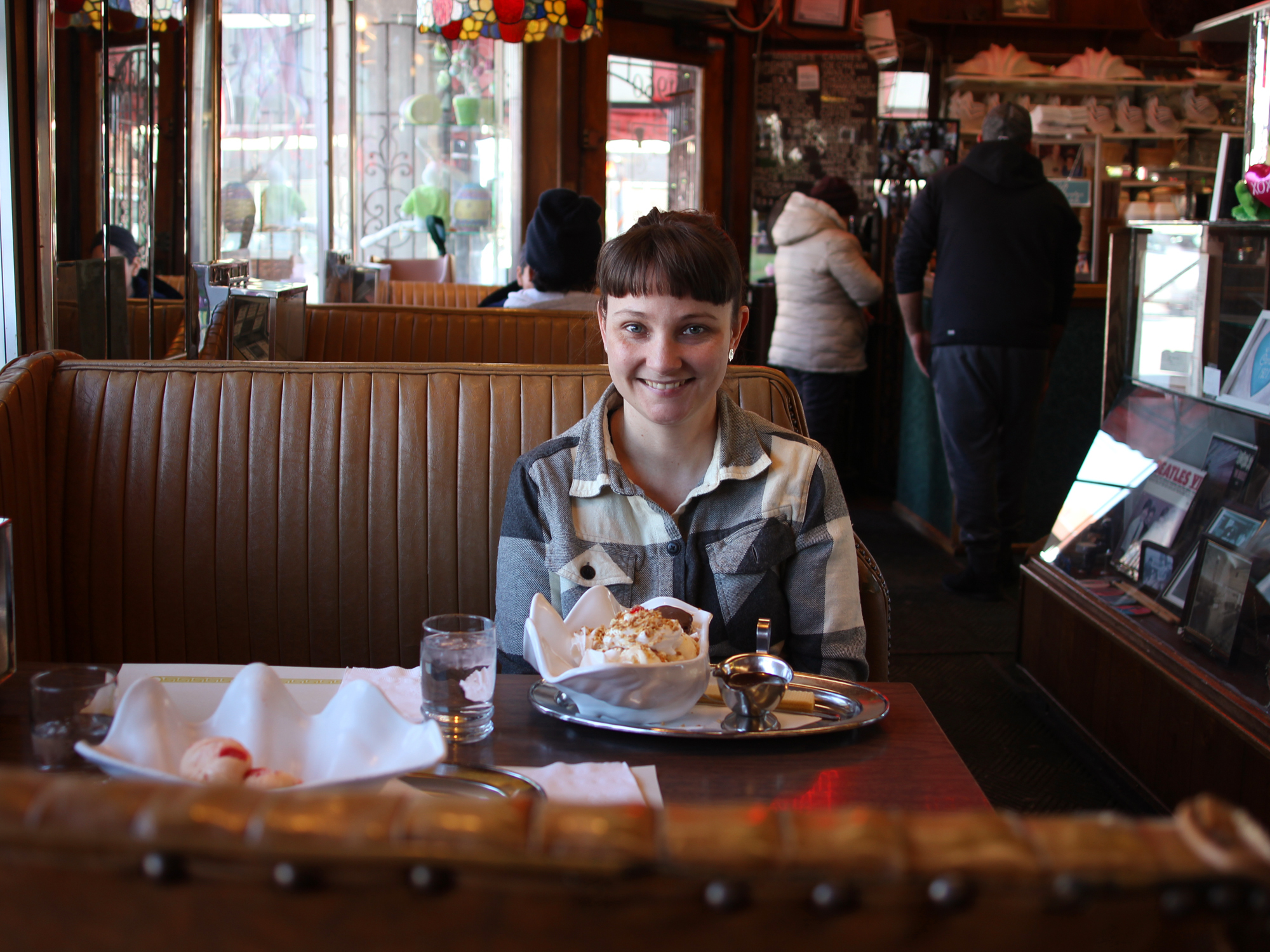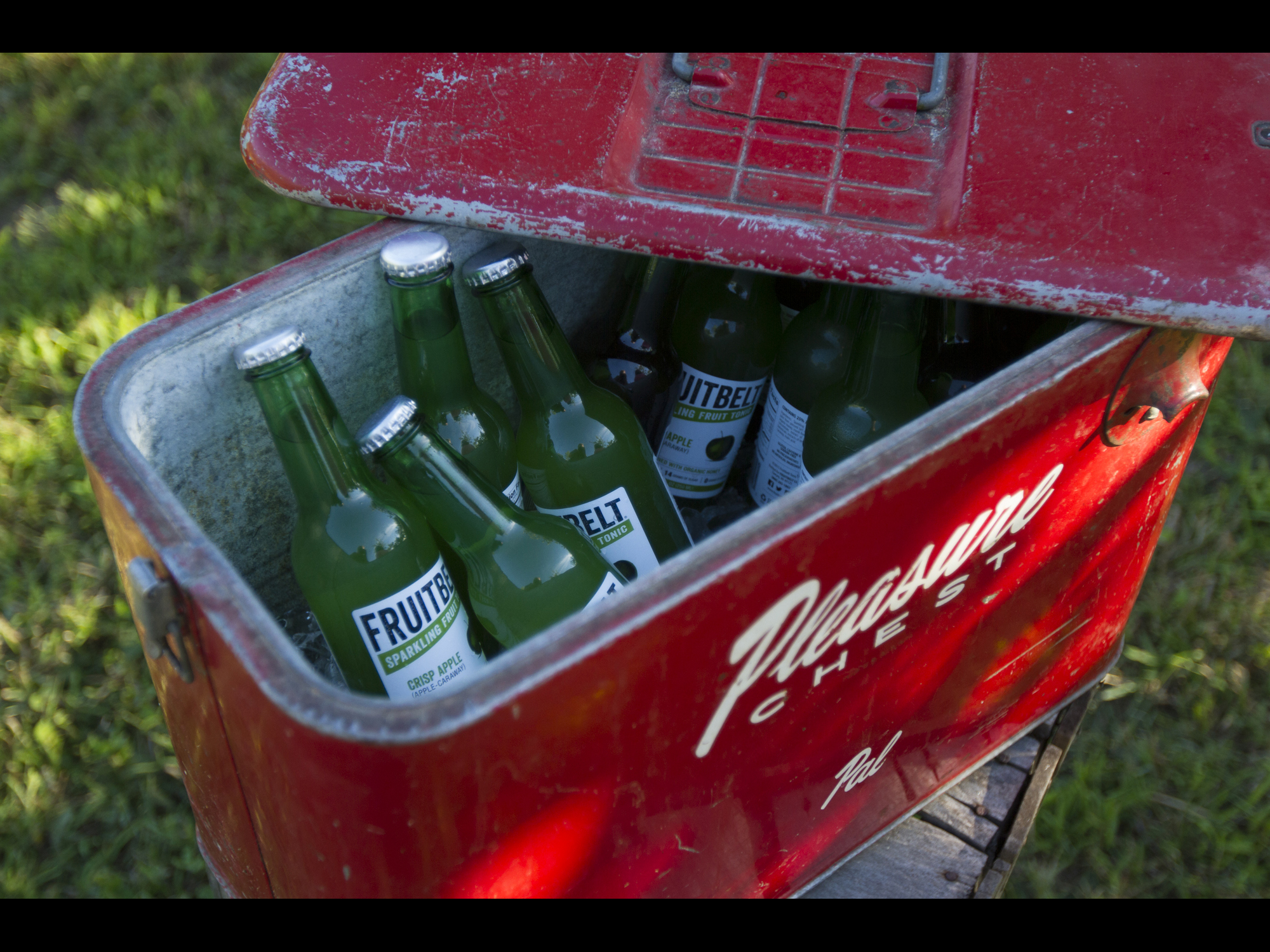STEPHANIE ANDREWS AND RYAN REZVANI ARE, INDEED, each others’ exes, though they are not bitter—the occasionally snarky air between them makes them sound more like siblings than exes. But they’ve turned a short-lived romantic connection into a business concept, as they prepare to launch their Chicago-based craft bitters company, Bitter Ex.
Here’s how it started. About three years ago, Andrews and a friend walked into K’s Dugout, a bar where Rezvani was bartending. “We were not prepared or dressed properly to go out in public,” says Andrews. “We didn’t exactly look our best.”
“I concur,” Rezvani says.
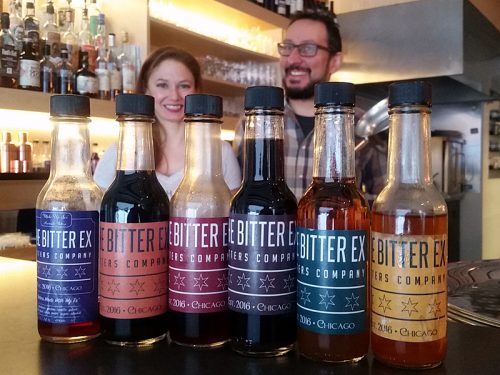
Stephanie Andrews and Ryan Rezvani
Some guy—not Rezvani, yet—started hitting on Andrews relentlessly. “One of my regulars,” he says. “And I did my best to distance him from her. And then I asked her if she wanted a shot, because I felt bad. That’s what bartenders do, they buy people a shot to fix things.”
She graciously accepted—and requested that the shot be bitters.
Rezvani was surprised. “Why bitters?” he asked. The high-proof alcoholic concoction, which is steeped with botanical seeds, fruits and spices, is usually mixed into drinks in miniscule amounts, like extracts are used in baking. It’s not typically consumed straight, by the ounce.
Andrews explained that she and her friends had a tradition of drinking bitters. And, she added, she also made bitters herself.
Rezvani, who had also been creating bitters for years, was shocked. “I was like, ‘Holy crap, a person who makes bitters!’ I had never met [another] person that made bitters, and I thought that was really cool.”
Andrews got into doing shots of bitters living on Washington Island in Door County, Wisconsin, where it’s a tradition. During Prohibition bitters qualified as a “medicinal” use of alcohol, and a local pub, Nelsen’s Hall Bitters Pub & Restaurant, began operating as a pharmacy to remain open. “When they weren’t allowed to sell liquor, they would sell bitters to people at the bar,” says Andrews. Today, she says, ordering bitters occasionally nets her a free shot. “A lot of bartenders would go, ‘There’s no liquor in this, so we’re not charging you.’ And I would be like, ‘Actually you might want to check the label on that.’”
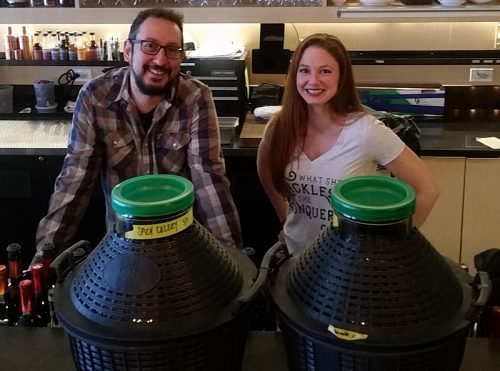
At first Andrews thought Rezvani was mocking her when he claimed to make bitters, too. But they quickly geeked out on the subject, and proceeded to go out on a date in which they both brought the same bitters recipe book, unknowingly, to show one another. That led to future dates, where they were making bitters together, trying recipes like blood orange almond and other flavors.
I feel like every day I tell somebody what bitters are. That’s also my mother a couple times a week, I have to tell her.
Andrews isn’t in the food industry—she’s a freelance writer and a stuntwoman in local TV and film production. But Rezvani recalls that she had a knack for coming up with creative flavor combinations, such as pistachio cherry, blueberry walnut and coffee. “I always liked cooking and baking, and this was a really fun hobby for me, and a way to relax,” she says. She shared with him that she dreamed of one day starting her own bitters company. He was impressed.
But a relationship takes more than love of bitters, and they found that between the two of them, some ingredients were lacking. In time, they drifted apart. Until the bitters which brought them together in the first place drew them back again.
THE SECOND STAGE OF THEIR RELATIONSHIP also started with Rezvani working a bar—he went to Ampersand, a wine bar in the Lincoln Square neighborhood, and set about creating a culinary-inspired cocktail menu. As part of that, he wanted to make the bitters that the bar would use. Rezvani started thinking about building a business centered around bitters. He thought back a couple of years, to Andrews’ creative flair for bitters recipes.
“We worked really well together,” he says. “She really has a great knack for recipes, she has a really strong history of cooking and baking to begin with, and that familiarity translates really well to bitters.” He called her and asked if she was interested in working together. She said yes.
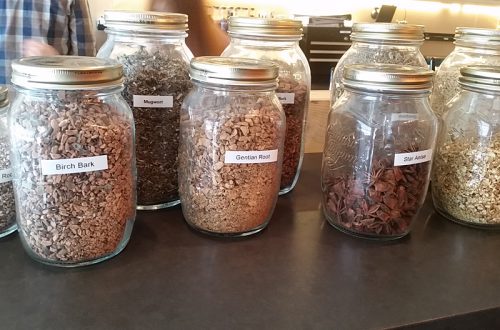
Ingredients
If anything, it was the name that made Bitter Ex happen. “I had mentioned how Stephanie had a name for a bitters company called Bitter Ex, and I always thought that was so great,” Rezvani says. “Ampersand’s owner’s girlfriend does marketing and PR. She’s like, ‘You have to do this. You have to start this company.’ And I’m like, ‘A, I can’t use that name. And B I can’t do this on my own.'”
“I thought it would just be us making bitters for Ampersand. I didn’t actually expect it to be something that would take off,” Andrews says. “He knows the business and the market a little bit better than I do, so I had no idea that bitters were, I guess, becoming so popular, even with the craft cocktail thing being such a boom. ‘Cause a lot of times, now even, we’ll talk to people and people are like, ‘Okay, what is bitters? I know of it, but I’m not quite sure.’”
“I feel like every day I tell somebody what bitters are,” Rezvani says. “And that’s also my mother a couple times a week, I have to tell her.”
And so the two exes came together to create a lineup of bitters, each with titles that loosely play with the soured relationship theme: Make-up Sex (aromatic bitters), Stalking Ex (spicy celery bitters), Cream Yourself (coffee bitters), Drunk Texting (citrus bitters) and Float Yer Boat (root beer bitters).
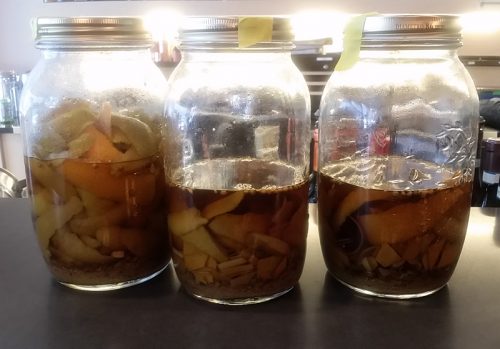
Macerating fresh ingredients
They get together a few times a month to “embitter,” which is, essentially, placing bittering agents (wormwood, birch bark, gentian root, mugwort, dandelion root) along with flavorings, like lemon peel, cloves, star anise and coriander seeds into a large vessel with liquor, allowing them to macerate for 10 days to four weeks, while agitating the concoctions daily to distribute the flavors.
The bitters are served in the cocktails at Ampersand, like the M-Dash, made with bourbon, beets, pink pepper corn and clove. That combination needed a piquant citrus bitter, which Bitter Ex makes, with multiple types of citrus and spices, such as coriander. “The drink is already complex and pretty well-balanced, but adding this bitters to it really rounds it off nicely,” says Rezvani. The Manhattan and Old Fashioned each use three different bitters— aromatic, citrus, and cherry vanilla; the spicy celery goes into the bloody Mary and the root beer bitters are used in a watermelon cocktail.
Monday they launched a Kickstarter to bring their bitters to the general public for purchase; $25 and up gets you an assortment of the bitters, along with various other prizes from stickers to bitters haikus. As Rezvani says, “I love the idea of that kind of fundraising because it’s not just asking for money for nothing, and it’s not necessarily an investor.” Instead, you’re raising cash from “people who are interested in helping you and getting something in return, and being part of it.”
While Rezvani and Andrews joke about their history (their titles are co-founder, co-chef, co-ex), they have reason to be excited about their future together. Even if it is, unquestionably, bitter.
“We’re friends, we get along and there’s no bad blood at all,” says Rezvani. “That really lets us play with the ‘ex’ thing. We’re on the same team about it.”
Kate Silver is the author of Frommer’s Easy Guide to Chicago, and she eats, drinks and sleeps her way around Chicago and other cities all in the name of research for outlets including Washington Post, The Telegraph, Saveur and others. Follow her on Instagram at @thekatesilver.
Latest
Join the Discussion
After you comment, click Post. If you're not already logged in you will be asked to log in or register with Disqus.






